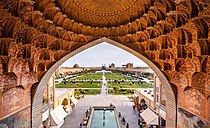| Part of a series on |
| Islam in Iran |
|---|
 |
| History of Islam in Iran |
| Scholars |
| Sects |
| Culture |
| Architecture |
| Organizations |
|
|
Bonyads (Persian: بنیاد "Foundation") are charitable trusts in Iran that play a major role in Iran's economy. They control an estimated 20% of Iran's GDP,[1] and are second only to the oil industry in manufacturing, trading, and real estate development in Iran.[2] As of 2010, the largest bonyad is the Mostazafan Foundation, worth approximately $10 billion. In addition to large national bonyads like the Mostazafan Foundation, there are numerous bonyads affiliated with local clerics in "almost every" Iranian town.[3] All are answerable only to the Supreme Leader of Iran. As of 2008, bonyads employ somewhere between 400,000[4] and 5 million Iranians.[5]
Technically religious charitable organizations, they have evolved into "giant private monopolies with no governmental oversight",[6] and are now described as channeling revenues to groups supporting the Islamic Republic,[7] while providing limited and inadequate charity to the poor.[2] Exempt from taxes and benefiting from "huge subsidies from government," they have been called "bloated,"[2] and "a major weakness of Iran's economy,"[5] that siphons off production to the lucrative black market.[2]
- ^ Molavi, Afshin, Soul of Iran, Norton, (2006), p.176
- ^ a b c d Mackey, Sandra Iranians, Persia, Islam, and the soul of a nation, New York: Dutton, c1996 (p.370)
- ^ Cite error: The named reference
Klebnikovwas invoked but never defined (see the help page). - ^ Abrahamian, Ervand, History of Modern Iran, Columbia University Press, 2008, p.178
- ^ a b Cite error: The named reference
Katzmanwas invoked but never defined (see the help page). - ^ Saeidi, Ali A. (29 January 2009). "Iranian Para-governmental Organizations (bonyads)". MEI.edu. Middle East Institute. Retrieved 25 October 2023.
- ^ Cite error: The named reference
roy-139was invoked but never defined (see the help page).
